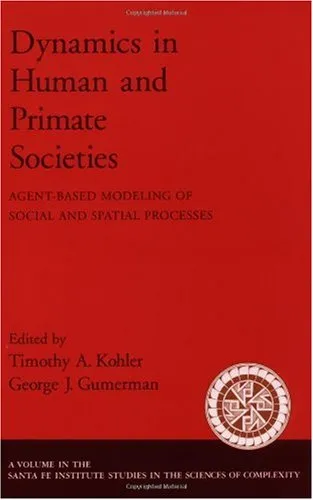Labour Relations in Eastern Europe: Organizational Design and Dynamics (Social Analysis)
3.5
بر اساس نظر کاربران

شما میتونید سوالاتتون در باره کتاب رو از هوش مصنوعیش بعد از ورود بپرسید
هر دانلود یا پرسش از هوش مصنوعی 2 امتیاز لازم دارد، برای بدست آوردن امتیاز رایگان، به صفحه ی راهنمای امتیازات سر بزنید و یک سری کار ارزشمند انجام بدینکتاب های مرتبط:
معرفی کتاب: Labour Relations in Eastern Europe: Organizational Design and Dynamics (Social Analysis)
کتاب Labour Relations in Eastern Europe: Organizational Design and Dynamics اثری جامع و تحلیلی است که روابط کارگری را از منظر طراحی سازمانی و پویاییهای اجتماعی در کشورهای اروپای شرقی بررسی میکند. این کتاب، نوشتهی K. Petkov، در فضای پساشوروی به تبیین پیچیدگی تعاملات میان کارفرمایان، نهادهای کارگری، قوانین کار و سیاستهای اجتماعی میپردازد.
این اثر، علاوه بر ارائهی چشماندازی تاریخی به چالشها و تحولات مربوط به روابط کار در اروپای شرقی، چگونگی بازتعریف معیارهای سازمانی در دوران تغییرات عمیق اقتصادی و اجتماعی را تحلیل میکند. نویسنده با رویکردی علمی و استناد به دادههای کمّی و کیفی، این حوزه را از زاویهای منحصر به فرد بررسی نموده است.
خلاصهای از کتاب
این کتاب به چهار بخش اصلی تقسیم شده که هرکدام تلاش میکند جنبهای خاص از روابط کار در اروپای شرقی را تبیین کند. K. Petkov با ترکیب مفاهیمی چون Social Analysis و Organizational Design موفق میشود تا نگرشی چندلایه به مسائل پیچیده روابط کار ارائه دهد. بخش اول به مبانی تاریخی دورههای مختلف اقتصادی و سیاسی در این منطقه پرداخته و زمینههای شکلگیری روابط کار مدرن را بررسی میکند. در همین حال، بخش دوم بر نقش ساختارهای سازمانی و تعاملات نهادین تمرکز دارد. بخشهای سوم و چهارم نیز به بررسی دقیقتر مدلهای مدیریتی و پویایی اجتماعی میپردازند.
این کتاب همچنین ابزارهای تحلیلی متنوعی از جمله دادههای آماری، مدلهای اقتصادی و مطالعات میدانی را ترکیب میکند و کاربرد آنها را در بازسازی روابط کار شرح میدهد. توجه ویژه به تغییرات پس از فروپاشی شوروی، خواننده را به درک بهتری از این دگرگونیهای ریشهای میرساند.
نکات کلیدی کتاب
- تحلیل تأثیر فرآیندهای سیاسی و اقتصادی بر روابط کار در اروپای شرقی
- بررسی روابط بین نهادهای دولتی، اتحادیههای کارگری و کارفرمایان
- استفاده از مفهوم Organizational Design برای تحلیل ساختار سازمانها
- پیشبینی چالشها و فرصتهای آتی برای بازار کار منطقه
- همبستگی میان تغییرات اجتماعی و رفتارهای مدیریت سازمانی
جملات مشهور از کتاب
"The dynamics of labor relations in post-socialist Eastern Europe reflect the struggle of societies to redefine their economic and social systems."
"Organizational Design is not a static framework; it is a living structure adapting to external and internal pressures."
چرا این کتاب مهم است؟
کتاب Labour Relations in Eastern Europe برای دانشجویان و محققین علوم اجتماعی، اقتصاد و مدیریت سازمانی از اهمیت ویژهای برخوردار است. این اثر نه تنها به جنبه تاریخی و تطبیقی روابط کار در اروپای شرقی میپردازد، بلکه ابزارها و نظریههای نوین را برای تحلیل پویاییهای این حوزه ارائه میدهد. خواندن این کتاب به شما کمک میکند تا درک عمیقتری از تغییرات فرهنگی، اقتصادی و اجتماعی این منطقه پیدا کنید.
این کتاب همچنین به سیاستگذاران و مدیران امکان میدهد تا در فرآیند تصمیمسازی آگاهانهتر عمل کرده و به چالشهای پیش روی نیروی کار پاسخ مناسبتری دهند. از همین رو، این اثر بهعنوان یکی از منابع کلیدی در حوزه روابط کار و Organizational Design شناخته میشود.
Introduction
Labour Relations in Eastern Europe: Organizational Design and Dynamics is an in-depth exploration of the ever-evolving world of labor systems and industrial relations within the diverse socio-economic landscapes of Eastern Europe. Written with a focus on analytical clarity and backed by rich empirical data, this book examines the intersection of historical legacies, modern organizational structures, and the dynamic nature of worker-management interactions.
As the region navigates the tumultuous shift from planned economies to market-driven paradigms, labor relations have proven to be not just a technical issue of organizational design but a profoundly socio-political subject. This book dissects the implications of institutional, cultural, and economic transformations on the nature of work, employment relationships, and workplace dynamics. It explores how labor unions, employers, and governments in Eastern Europe have negotiated their respective roles in shaping modern industrial systems in the post-socialist era.
Aimed at scholars, policymakers, organizational leaders, and curious readers, this book sheds light on the challenges and prospects for industrial democracy, worker rights, and social justice within Eastern Europe's unique development trajectory. By blending theoretical frameworks with case studies from various countries, the book stands as a scholarly yet accessible resource for understanding one of the most important facets of the region's journey through economic transformation.
Detailed Summary of the Book
The book begins by setting the historical stage, outlining the legacy of centralized socialist systems and their accompanying labor relations. It delves into how these top-down systems shaped organizational structures, worker representation, and workplace dynamics in ways that were distinct from Western models. This foundational context provides the backdrop for understanding the subsequent transformation.
A core focus of the book is the transition to market economies and the corresponding reforms in labor relations. It examines how decentralized decision-making, privatization, and globalization have disrupted existing norms, creating both opportunities and challenges. Through country-specific examples—from Poland to Bulgaria and the Czech Republic—the book uncovers the diverse strategies adopted to recalibrate labor systems in each nation.
Another central theme is the evolving role of trade unions and collective bargaining practices. The book investigates the rising tensions between labor and capital, highlighting the power struggle between workers, employers, and governments in an era of increasing inequality. By integrating insights from sociology, political science, and management theory, the book dissects why some industrial systems have adapted successfully while others remain mired in conflict or stagnation.
Key Takeaways
- Labor relations in Eastern Europe are highly contextual, shaped by a combination of historical, cultural, and economic factors.
- The transition from socialism to capitalism profoundly altered workplace dynamics, presenting both challenges and opportunities for all stakeholders.
- Trade unions played a crucial role during the socialist era but are currently undergoing redefinition in their role and function.
- Industrial democracy is key to ensuring social justice and economic equity in the post-transition economies of the region.
- Case studies demonstrate the varying levels of success in labor reform across Eastern European nations, highlighting the importance of institutional design.
Famous Quotes from the Book
"The legacy of command economies continues to cast a long shadow over labor relations, where trust and collaboration often succumb to suspicion and conflict."
"The true test of a labor system is not merely its economic efficiency but its capacity to empower workers and uphold social equity."
"In navigating the turbulence of transition, Eastern Europe offers valuable lessons—not just in what to do, but also in what to avoid."
Why This Book Matters
This book goes beyond the surface analysis of labor relations to uncover the intricate interplay of political, economic, and social forces that shape workplace dynamics in Eastern Europe. It matters because it provides a nuanced understanding of how labor systems adapt—or fail to adapt—in the face of transformative change.
For policymakers, the book serves as a guide for designing labor reforms that balance the needs of workers and businesses while fostering economic growth. For scholars, it is a valuable resource for understanding the complexities of post-socialist transformation. For practitioners and business leaders, it offers practical insights into navigating the challenges of industrial relations in a rapidly changing environment.
In an era where globalization and economic inequality dominate headlines, understanding the successes and struggles of Eastern Europe’s labor systems provides not just regional relevance but global significance. This book is a call to critically rethink labor relations, institutional design, and the importance of social justice in fostering sustainable societies.
دانلود رایگان مستقیم
شما میتونید سوالاتتون در باره کتاب رو از هوش مصنوعیش بعد از ورود بپرسید
دسترسی به کتابها از طریق پلتفرمهای قانونی و کتابخانههای عمومی نه تنها از حقوق نویسندگان و ناشران حمایت میکند، بلکه به پایداری فرهنگ کتابخوانی نیز کمک میرساند. پیش از دانلود، لحظهای به بررسی این گزینهها فکر کنید.
این کتاب رو در پلتفرم های دیگه ببینید
WorldCat به شما کمک میکنه تا کتاب ها رو در کتابخانه های سراسر دنیا پیدا کنید
امتیازها، نظرات تخصصی و صحبت ها درباره کتاب را در Goodreads ببینید
کتابهای کمیاب یا دست دوم را در AbeBooks پیدا کنید و بخرید














